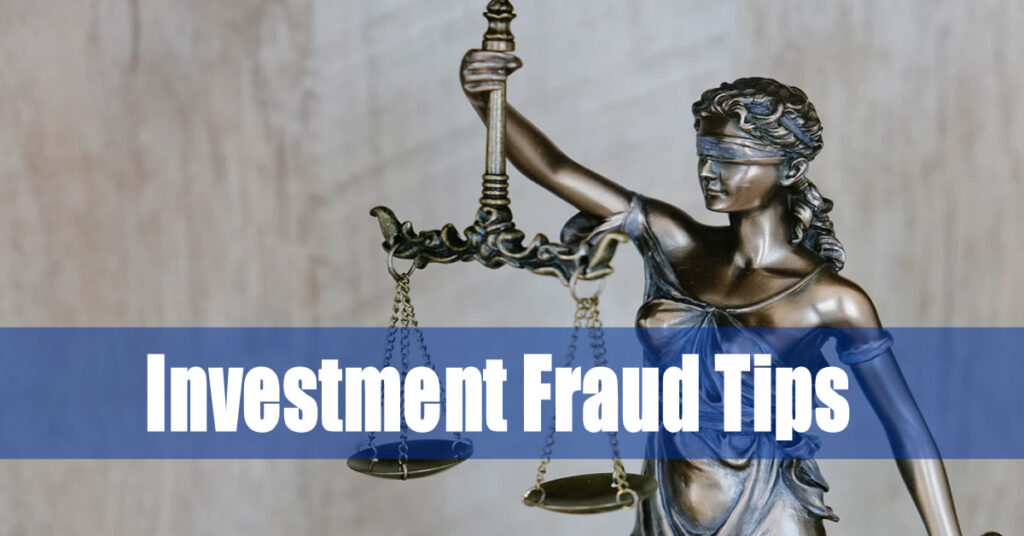Investment fraud is a scary reality many face today. Every year, countless individuals fall victim to tricky scams promising big returns and lose money. This blog will arm you with 10 essential tips to spot and steer clear of such fraudulent schemes, ensuring your investments are secure.
If you’ve been misled or deceived by a financial advisor, broker, or firm, resulting in significant investment losses, you need experienced legal representation. Haselkorn & Thibaut, a national law firm specializing in investment fraud, is here to fight for your rights and help you recover your losses.
Our skilled investment fraud lawyers have extensive experience handling a wide range of cases, including:
Ponzi schemes
Misrepresentation or omission of material facts
Unauthorized trading
Unsuitable investments
Breach of fiduciary duty
Don’t let fraudulent actors get away with your hard-earned money. Contact Haselkorn & Thibaut today for a free, no-obligation consultation. Our dedicated team will review your case, explain your legal options, and work tirelessly to secure the compensation you deserve.
Keep reading; it’s eye-opening!
Key Takeaways
Table of Contents
Always check the background and registration of individuals or organizations offering investments to avoid fraud.
Be careful of investment offers that promise quick and guaranteed returns, as they may be scams.
Use caution if you feel pressured by high – sales tactics; real investment opportunities allow time for research.
Do your own investigation and talk with a financial advisor before making any investment choices.
Report any suspicious investment activity to authorities like the FTC or state securities regulators to help stop fraud.
Understanding Investment Fraud
Investment fraud comes in various forms with different tactics used to deceive investors. It is important to recognize the common types of investment fraud and be aware of the warning signs associated with each.
Common Types of Investment Fraud
Investment fraud can trick even the smartest investors. It uses deceptive practices to take your money. Here are some most common investment scams types:
Ponzi schemes promise high returns with little risk. They pay profits to early investors using newer investors’ money.
Pyramid schemes rely on recruiting others to invest. Your return depends on getting more people to join.
Stock market fraud includes illegal insider trading and spreading false information to drive up a stock’s price.
Real estate scams convince you to invest in properties that don’t exist or aren’t profitable.
Precious metals and coin scams involve selling overpriced or fake items, promising huge returns.
Seminar scams offer free workshops on investing strategies, then pressure you into buying expensive courses or investments.
Signs of an Investment Scam
Be cautious of anyone offering high returns with little or no risk.
Look out for real estate investment seminar scams, investment coaching scams, and precious metals and coins investment scams.
Monitor your investments closely for any signs of fraudulent activity.
Insist on regular written reports and look for signs of excessive or unauthorized trading of your investments.
Be skeptical of unsolicited offers and always verify the legitimacy of any investment opportunity.
Tips to Avoid Investment Fraud
Research the person/organization offering investment securities and exchange commission-only deals before committing. Check if the securities and individuals are registered with the appropriate authorities. Be cautious of high-pressure sales tactics when considering investment opportunities.
Beware of promises of quick and guaranteed returns from investment promoters. Do your own research and consult with a financial advisor before making any investment decisions.
Research the person/organization offering investment deals
Before committing your own money to any investment deal, thoroughly research the individual or organization presenting the opportunity. Seek out their professional background, check for any history of legal issues, and verify their credentials and qualifications.
Be cautious of flashy websites and unsolicited offers; always ensure that the person promoting the investment is legitimate before proceeding. Insist on getting written information about the investment opportunity and consult with someone you trust to evaluate its legitimacy.
Additionally, be vigilant for signs of excessive or unauthorized trading in your investments as fraudsters may try to take advantage of your trust.
Check if the securities and individuals are registered
Ensure securities companies and individuals are registered before investing, to avoid potential fraud. Look for signs of excessive or unauthorized trading in your investments. Be cautious of offers promising high returns with little or no risk.
Always verify the legitimacy of any investment opportunity to protect investor funds against fraudulent activity.

Be cautious of high-pressure sales tactics
High-pressure sales tactics are often used by investment fraudsters to rush you into deciding without careful consideration. These tactics can include creating a sense of urgency or scarcity, pressuring you to invest quickly, using false and misleading statements, and not giving you enough time to conduct thorough research on the opportunity.
Remember that legitimate investment opportunities will allow you the time needed to make an informed decision. Always be skeptical if someone is trying to push you into investing without providing all the necessary information or allowing you the opportunity to seek advice from a trusted financial advisor or family member.
Investment fraud warning signs, such as high-pressure sales tactics, should prompt caution. It’s important for investors to recognize these red flags and take steps like asking for written reports and verifying legitimacy before committing any funds.
Beware of promises of quick and guaranteed returns
Be cautious of investment deals promising quick and guaranteed returns, as they often involve high-risk or fraudulent schemes. Look out for unsolicited offers that sound too good to be true, and always verify the legitimacy of any investment opportunity.
Remember to be skeptical of anyone offering high returns with little or no risk, and seek advice from a trusted source before making any investment decisions.
Always exercise caution when encountering promises of fast and sure profits in investments. Verify the legitimacy of any potential opportunity before committing any money, ensuring you scrutinize flashy websites and exorbitant return claims.
Do your own research and consult with a financial advisor
Before making any investment decisions, it is crucial to conduct thorough research and seek advice from a trustworthy financial advisor. Insist on obtaining written information about any investment opportunity before committing funds.
Remember that seeking advice from someone you know and trust can provide valuable insights and help verify the legitimacy of an investment opportunity. Additionally, ensure that the company or person offering the investment deals is thoroughly researched to avoid falling victim to fraudulent schemes.
Monitoring your investments closely for signs of fraudulent activity is equally important. Recognize how investment fraudsters operate and report any suspicious sales pitches immediately.
Reporting Investment Fraud
– File a report with the FTC for federal investment fraud cases.
– Contact state securities regulators to report investment fraud locally.
Reporting to FTC
If you have fallen victim to investment fraud or suspect fraudulent activity in financial markets, report it to the Federal Trade Commission (FTC). Provide details of the scam, including any written materials, emails, receipts, and your contact information.
The FTC investigates reports and shares them with law enforcement agencies for further actions against fraudulent individuals or organizations.
Remember that insisting on regular reports and monitoring your investments closely can help in identifying potential signs of investment fraud. If you encounter any suspicious activities or misleading offers related to investments, reporting to the FTC plays a crucial role in protecting other potential victims while helping authorities take necessary legal actions against perpetrators of investment scams.
Reporting to state securities regulators
To report investment fraud to state securities regulators, gather all the relevant documentation and evidence of the fraudulent activity. Contact your state’s securities regulator as soon as possible to provide them with a detailed report including any suspicious sales pitches or promises of guaranteed returns.
Be ready to provide information about the individuals or organizations involved in the online investment fraud or scheme, ensuring that you include names, contact details, and any other pertinent information that could aid in their investigation.
Taking swift action can help prevent others from falling victim to similar scams and protect your own investments. By reporting investment fraud promptly, you may assist authorities in stopping fraudulent activities and holding perpetrators accountable for their actions.
Once reported, follow up on updates from the regulators regarding your case.
Reporting to the New York State Attorney General
Once you have reported investment fraud to the state securities regulators, consider reporting the securities fraud incident to the New York State Attorney General for further action. Provide detailed written reports and any evidence of fraudulent activity.
Look out for excessive trading of your investments or unauthorized actions and share this information with the Attorney General’s office as well. It’s crucial to be vigilant in monitoring your investments closely and promptly report any signs of deceptive practices or schemes to the relevant authorities like the New York State Attorney General.
Conclusion
Remember to research before investing and always verify legitimacy. Stay cautious of high-pressure sales tactics and promises of quick returns. Be proactive in monitoring your investments for any signs of fraudulent activity, report suspicious sales pitches, avoid investment scams and seek advice from trusted sources.
Insist on written reports and don’t hesitate to reach out for help if you suspect fraud. Trust your instincts, take action, and protect your hard-earned money from investment scams.
FAQs
1. What are investment fraud schemes?
Investment fraud schemes are tricks con artists use to fool investors into putting money in sham investments that have no real value.
2. How can I spot a financial scam?
You can recognize financial scams by looking for red flags like promises of high returns with no risk, pressure to invest quickly, and offers that sound too good to be true.
3. Why is it important to be aware of deceptive investment practices?
Being aware of deceptive real estate investment scams and practices helps you avoid losing your hard-earned money to fraudulent investments and con artist tactics.
4. What should I do if I suspect an investment is a swindle?
If you think an investment might be a swindle, stop investing immediately, report the scheme to authorities, and seek advice from trusted financial experts for protection.
5. How can investors protect themselves against investment deception?
To protect yourself against deception, always research before investing, ask questions about any warning signs you see, and make sure any offer is legitimate before handing over your money.


